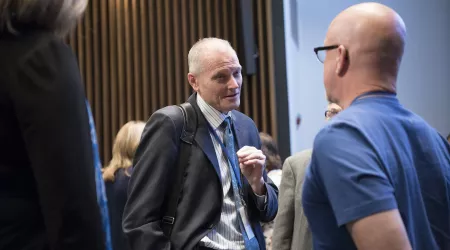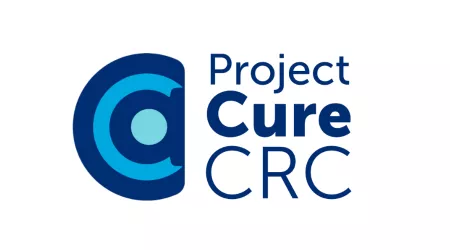What Alliance-funded researchers are working on now
Since 2016, the Alliance has provided more than $3 million in funding to researchers seeking to break barriers in the treatment, detection, and prevention of colorectal cancer. Over the next five years, we plan to commit $30 million more.
We check-in on a regular basis to see how their science is advancing. Below, we detail the latest on the eight current research projects funded through our Chris4Life Research Program.
Research Focus: Young-Onset Colorectal Cancer
Dr. Kimmie Ng is investigating how the microbiome is different in the very youngest CRC patients compared to those in their 30s, 40s, and over 50 years old, as well as compared to healthy young individuals. She will then examine whether those differences in the microbiome lead to worsening tumor growth and weakened immunity against the cancer in mouse models of young-onset CRC. Dr. Ng is the director of the Young-Onset Colorectal Cancer Center at Dana Farber Cancer Center in Boston which makes her uniquely situated to ask and answer these questions. The knowledge will then be used to discover new ways to change the microbiome to improve the immune response against CRC, and develop more precise ways to screen and treat people at different stages of life.
Dr. Joshua Meyer is investigating the genomic differences between young-onset colorectal cancer and those diagnosed at 50 or older. His research asks the question: Is colorectal cancer in a younger person and an older person the same disease, or is it distinct, requiring a different treatment approach? In his pursuit of an answer, Dr. Meyer has made important discoveries that are beginning to provide clarity. He and his team examined the specific changes in an important oncogene, KRAS, and found differences between younger and older patients, as well as differences between colon and rectal cancer patients. Dr. Meyer is at Fox Chase Cancer Center in Philadelphia, and he has published the most comprehensive evaluation of genes that are altered in younger versus older patients with colorectal cancer.
Dr. Robin Mendolsohn is gathering new insight on the cause of young-onset CRC by collecting data on exposures, including diet and the environment. She and her team will collect stool samples to determine whether the bacteria in the gut (the microbiome) plays a role in the development of this disease. The investigators are hopeful that this research will have implications on CRC prevention, as the make-up of the microbiome could potentially be changed with diet. Dr. Mendolsohn is at the Center for Young-Onset Colorectal Cancer, Memorial Sloan Kettering Cancer Center, New York.
Dr. Rosa Munoz Xicola is investigating characteristics about a novel type of colorectal cancer that appears in 25% of young-onset CRC patients. Her work will allow for more effective treatment in this population. This is extremely relevant research because understanding the molecular features that drive these colorectal tumors will help establish new therapeutic strategies. Young-onset CRC patients are currently given the same types of treatment as patients with later-onset CRC, even though clinical characteristics differ. Dr. Munoz Xicola is at Yale University School of Medicine in New Haven and has two publications that are to be published.
Dr. Benjamin Wienberg aims to identify the differences in the microbiome of young-onset CRC and those 50 and older to identify certain bacteria that could be used as targets for new therapies for patients with advanced disease. Research has found higher rates of certain bacteria in younger patients. The study continues to analyze remaining patient samples and the researchers hope to identify certain high-risk bacterial stool profiles that may be used to identify young patients at higher risk of developing colorectal cancer. Dr. Wienberg is at the Ruesch Center for the Cure of Gastrointestinal Cancers, Lombardi Comprehensive Cancer Center, Georgetown University Medical Center. He has presented results at the 2020 ASCO Annual Meeting.
Research Focus: Health Disparities
Dr. Kishore Guda aims to characterize the molecular profiles of colorectal cancers in African American versus European American patients. The investigators have accrued large numbers of colorectal cancer samples from African American and European American patients and have established relevant cancer cell and mouse models in the laboratory. Using these unique resources and methodologies, Dr. Guda and his team will discover and validate biologic mechanisms likely contributing to colorectal cancer health disparities. Importantly, the study is designed to decode the role of tumor biology as well as socio-demographic factors that jointly contribute to racial disparities in colorectal cancer outcomes. Overall, their studies will inform the development of new biomarkers and therapeutic strategies with the overarching goal of improving health equity in colorectal cancer. Dr. Guda is at Case Western Reserve University, Case Comprehensive Cancer Center in Cleveland.
Research Focus: Rectal Cancer
Dr. J. Joshua Smith is developing a model for the precise treatment of rectal cancer. His work has established a rectal cancer model, known as organoids, which better mimic patient-specific characteristics and serve as the optimal model for studying rectal cancer biology. These organoids are grown from very small amounts of tissue. This model could be used to study rectal cancer and individual responses to treatment, providing patients with more precise therapies. Dr. Smith and team have published articles on their findings in three journals and, as a result of findings through the Alliance grant, have received continued funding from NIH. Dr. Smith is at Memorial Sloan Kettering Cancer Center in New York.
Research Focus: Prevention
Dr. Megan Hitchins is developing a “minimally-invasive” blood-based screening test suitable for the early detection of CRC in people under 50 years old. The team has developed assays capable of detecting ctDNA markers at potentially very low levels in blood, with the ultimate aim of producing a screening test that includes a panel of the best-performing ctDNA markers. Encouragingly, the ctDNA blood tests have even positively detected the few patients in their study who were diagnosed with precancerous adenomas. This research is now much closer to producing a blood test suitable for the early detection of CRC. This research has led to two papers awaiting publications and numerous grants, including a grant from NIH. Dr. Hitchins is in the Department of Biomedical Sciences, Cedars-Sinai Medical Center, in Los Angeles.
Top resources

FDA approves ColoSense, mt-sRNA screening test from Geneoscopy
ColoSense is a screening test for adults, 45 years of age or older, who are at average risk for developing colorectal cancer (CRC).

Dr. John Marshall joins the Alliance as Chief Medical Consultant
A veteran in the field of gastrointestinal cancer research, Dr. Marshall will share his leadership experience and scientific expertise to guide the Alliance’s patient support and research initiatives, particularly Project Cure CRC.

Alliance Announces Request for Proposals as it Launches the Largest-Ever CRC Research Investment
In an effort to expedite its life-saving work, the Colorectal Cancer Alliance (Alliance) Project Cure CRC initiative is excited to open its Request for Proposals (RFP). Tens of millions of dollars will be available to researchers from around the world whose work aims to expedite colorectal cancer (CRC) research to a curable science.





